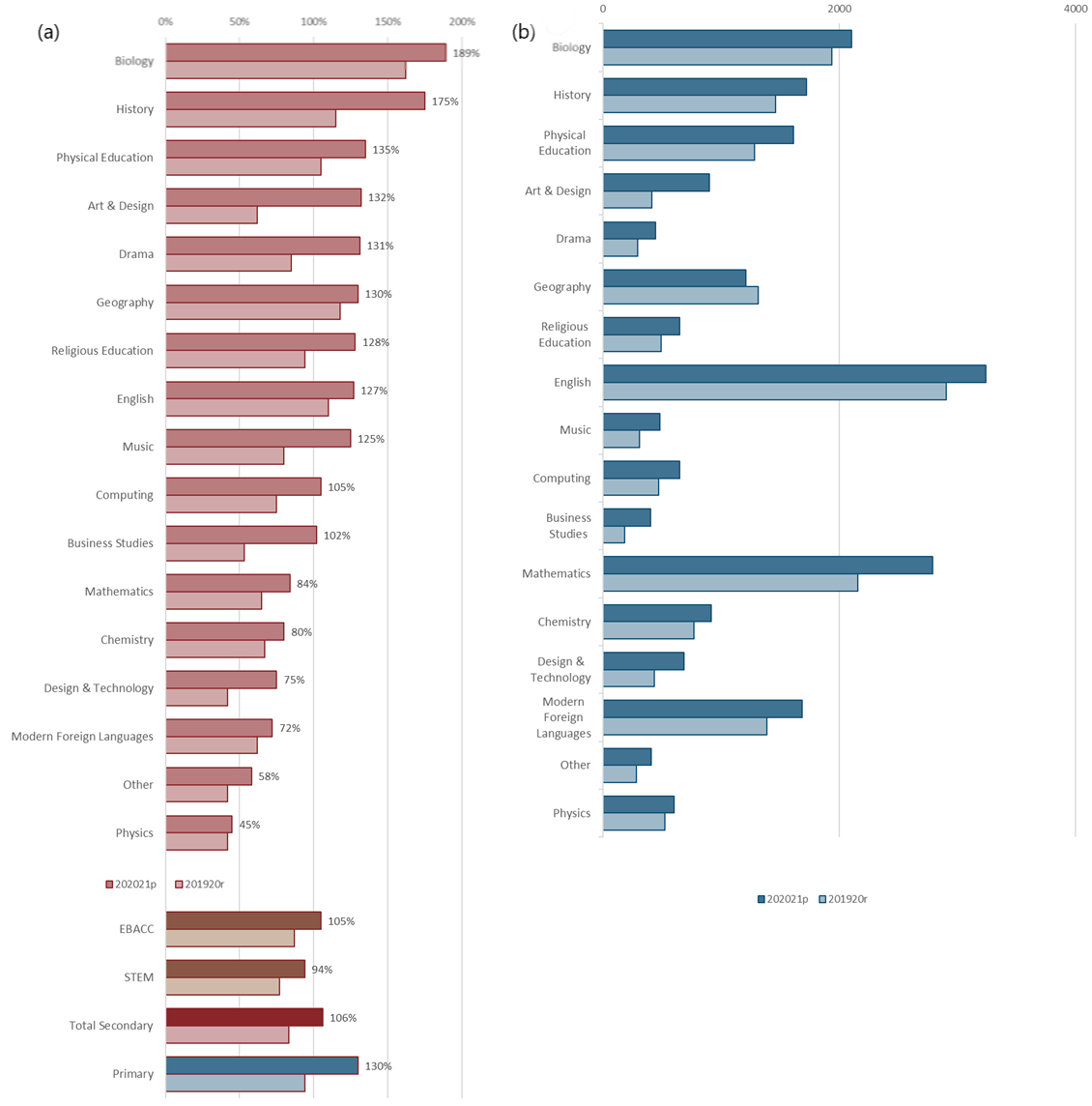Teacher training target met for first time in 8 years

The government has met its secondary teacher training target for the first time in eight years - signifying a boost in interest in the profession driven by the Covid crisis.
The overall number of people starting teacher training has risen 23 per cent on last year - with 41,472 new entrants in 2020-21, compared with 33,799 in 2019-20, according to provisional statistics from the Department for Education (DfE).
The news comes after research showed the Covid-19 recession had reignited interest in the teacher training sector - with a 35 per cent year-on-year increase in applications between March and August 2020.
Coronavirus: Lockdown teacher training applications leap by a third
Exclusive: Teacher training bursaries ‘cut by 50%’
Last year: DfE misses its own teacher training recruitment targets
Recruitment goals at secondary level were exceeded for the first time since 2012-13, with the number of new entrants amounting to 106 per cent of the target set by the Teacher Supply Model (TSM). Trainee numbers increased for all subjects except geography and classics.
Last year, revised figures show just 83 per cent of the secondary target was met.
And at primary level, 130 per cent of the recruitment target was achieved - a significant increase on last year (94 per cent). The DfE said this was due to a combination of a 22 per cent increase in the numbers recruited and a 12 per cent decrease in the TSM target compared to the previous year.
But the boost in recruitment performance has not solved ongoing problems in key shortage subjects.
At secondary level, just 45 per cent of the TSM target was achieved for physics - an increase of only 3 percentage points on last year.
Entry numbers also fell short of targets in MFL (72 per cent), design and technology (75 per cent), chemistry (80 per cent), and maths (84 per cent).

However, there was better news for some subjects where trainee numbers had previously dipped below target levels.
For business studies, the TSM target was met by 102 per cent, a huge increase on last year’s 56 per cent.
And the target for art and design - a subject for which bursaries were introduced last year - was met by 132 per cent, compared with 62 per cent in 2019-20.
Meanwhile, the overall target for English Baccalaureate (EBacc) subjects was met by 105 per cent.
For most subjects where the TSM target was exceeded, this was a result of higher numbers of new entrants with a largely unchanged target, the DfE said.
“A key exception was geography where there was an 8 per cent decrease in the number of new entrants compared with 2019-20, but also a decrease of 17 per cent in the TSM target so the target was still exceeded,” the department added.
The DfE said the percentage of the TSM postgraduate target achieved for all subjects (primary and secondary), at 115 per cent, was driven by both an increase in the number of postgraduate new entrants and a decrease in the TSM target compared to last year.
In October, the government announced that postgraduate bursaries for all eligible subjects had either been reduced or scrapped altogether.
This year, chemistry, computing, maths, physics, biology, languages and classics trainees could all apply for bursaries of £26,000.
But the picture is very different for 2021-22. Bursaries for chemistry, computing, maths and physics trainees will be reduced to £24,000, while languages and classics students will be eligible for just £10,000.
School standards minister Nick Gibb said: “We have seen a tremendous surge in the number of new trainee teachers this year - over 7,000 more than in 2019 - which goes to show that teaching continues to be an attractive career option.
“This includes a significant increase across both undergraduate and postgraduate trainees, and with 23 per cent of postgraduate entrants holding a first class degree the quality of this year’s trainee teachers remains high.
“Teaching is a rewarding and vital profession and it’s thanks to the incredible efforts of teachers and school staff that pupils have continued to receive an excellent education this year.”
You need a Tes subscription to read this article
Subscribe now to read this article and get other subscriber-only content:
- Unlimited access to all Tes magazine content
- Exclusive subscriber-only stories
- Award-winning email newsletters
Already a subscriber? Log in
You need a subscription to read this article
Subscribe now to read this article and get other subscriber-only content, including:
- Unlimited access to all Tes magazine content
- Exclusive subscriber-only stories
- Award-winning email newsletters
